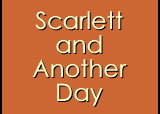A great strength of the film is the ending. Nothing less than the optimism Scarlett evokes would be as attractive to an American audience, while her determination to face the future by returning to the past is equally attuned to the national mentality. The question of who or what triumphs at the end is sometimes raised and often answered in terms of an old/new dichotomy.NOTE 21 I say something older indeed prevails: the romantic myth in its personification, Scarlett.
This myth, as I have argued throughout, defines romance as male dominance and female submission. Additional traditions, such as that of rugged individualism and the American ambivalence over agrarian virtues versus urban and technological progress, serve to complicate further an already gendered situation because those traditions have been implicitly male-oriented. But Scarlett's apparent desire to get Rhett back verifies her femininity, and with it the myth; however ambiguous she has repeatedly appeared, however unacceptable she has been as a female in her self-serving individualism, she is redeemed at last by her belief that her happiness is rooted in emotional dependence on a man.
Just as the film's plot replicates power relationships rooted in gender, so does the history of its making and its reception, raising the issue of how many (and what kind of) "gazes" are responsible for the final product, not to mention the decades of commentary.NOTE 22 My reading suggests the film contains a complex mixture of male and female perspectives (as our society has defined them); however, in the end, in both the film (in the form of Scarlett's professed desire for Rhett) and its saga (in the reviews arguing love-it-as-entertainment/ hate-it-as-art), the male gaze wins. So far.
If the day comes when every institution is not dominated by masculine values and traits, when women's experiences are taken as seriously as men's, when portrayal of those experiences unhesitatingly are considered art, paradoxically Gone With the Wind will lose and gain status: Its role as purveyor of the romantic myth will be of historic interest only, while its astute exposure of women's dilemmas and choices will place it even more firmly inside that canon reserved for "great" films. In losing the tension that underlies its popularity, then, its status may actually shift from "popular" to "art" film and, also paradoxically, it may generate less discussion. But all this is speculation and anything could happen. "After all, tomorrow . . ."





